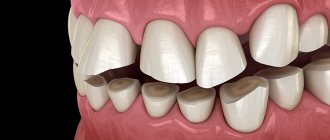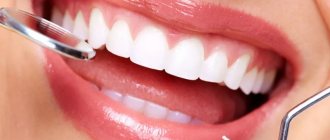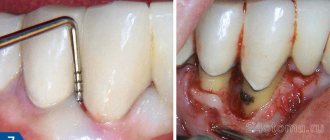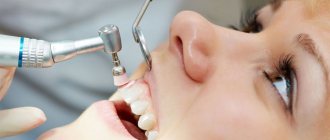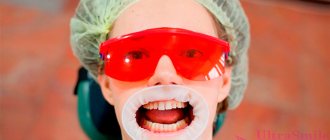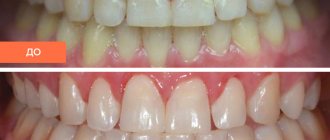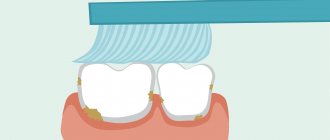Reasons for the development of the gag reflex
The reasons for the appearance of a gag reflex when caring for the oral cavity are:
- Pregnancy. Women often experience unusual reactions during this period. The taste of the paste can cause severe nausea and make you feel unwell.
- Stress. The body in this condition may not respond correctly to irritants, including brushing teeth, using mouthwash, toothpaste or floss.
- Smell. The care products have a sharp, pronounced aroma. These scents are not suitable for everyone, especially for some specific ingredients.
- Taste. This characteristic of cleaning products is also not suitable for everyone. The only option is an individual choice of composition with an optimal, tolerable taste.
- Mechanical impact. Brushes with different types of bristles can irritate the mucous membrane, causing a gag reflex.
- Fluorine. This element provides protection to the enamel, but it is what causes nausea in many people.
Poisoning
The appearance of nausea while brushing your teeth may coincide with food poisoning or intestinal infection, the symptoms of which are:
- loose stools;
- constant nausea;
- high temperature;
- weakness, headache.
Food poisoning
In this case, the area at the root of the tongue will be overly sensitive due to intoxication of the body with microbial substances or low-quality products. If these sensations are influenced by a toothbrush or too harsh toothpaste, then another attack of vomiting may be provoked.
Stages
Nausea when brushing your teeth is usually a defensive reaction that is triggered by an irritant, for example, the strong taste of toothpaste. The mechanism of development is quite simple - when cleaning, discomfort is felt, while the person looks at himself in the mirror. A signal is sent to the brain and a reaction develops in the form of vomiting to eliminate the irritant.
The reflex develops through four stages:
- the condition worsens, irritability, fatigue appear, and there is a urge to vomit;
- nausea develops;
- after vomiting there is relief;
- in the intervals between deteriorations, the person feels normal.
If the problem affects children
Children have their own reasons for nausea from brushing their teeth. This can also be affected by an unsuccessful trip to the dentist, which causes fear and a certain amount of stress during the procedure.
Only the right calm conversation with the baby will help here. You need to explain to your child that brushing your teeth will not hurt. And how necessary it is so that you no longer have to go to the doctor.
At the first stage, you should allow him to brush his teeth as much as he can, and then gradually increase the time. You should not force a child to brush their teeth. Doing it this way will only make the problem worse.
A child can be attracted to the procedure by acting it out. It’s worth coming up with some kind of game: “Who is faster” or “Counting teeth” and others. Over time, the baby will stop being afraid and take the procedure for granted if the parents carry out the process with him.
Colgate range of toothpastes for adults and children.
In this article, we will find out together which foods are harmful to teeth.
Follow the link https://www.vash-dentist.ru/krasota-i-uxod/preparatyi/poleznyie-dlya-zubov-produktyi.html if you are interested in the most useful products for teeth.
Elimination methods
To eliminate the gag reflex, you need to find out the cause, and then take actions aimed at eliminating it. Methods to combat the gag reflex:
- replacing toothpaste with a composition with a different flavor, for example, mint paste with a product with a fruit flavor;
- replacing a brush with a different stiffness and type of bristles;
- When cleaning, do not touch the area of the tongue, when pressed, a reflex appears;
- Do not press the brush against the buccal mucosa.
If the vomiting effect is accompanied by pain and other unpleasant sensations, it is recommended to visit a doctor. There is a possibility that the condition is caused by soft tissue diseases and the need to treat pathology.
In children, this condition is caused by stress or fear of the cleaning procedure. The child needs to be reassured and oral care should be started in the form of an exciting game that will not cause fear.
Tip #5: Don't brush your teeth right after eating
You should especially not do this immediately after a very heavy snack and on a full stomach. After eating food, simply rinse your mouth with water or a special rinse, and only after at least half an hour can you begin to thoroughly clean your tongue, teeth and gums.
Notice
: Undefined variable: post_id in
/home/c/ch75405/public_html/wp-content/themes/UltraSmile/single-item.php
on line
45 Notice
: Undefined variable: full in
/home/c/ch75405/public_html/wp-content /themes/UltraSmile/single-item.php
on line
46
Rate this article:
( 3 ratings, average: 5.00 out of 5)
prevention
Consulting specialist
Kashaeva Victoria Nikolaevna
Specialization: Dental hygienist Experience: 8 years
Improper hygiene procedures
The reason that should be ruled out first. You can easily do this yourself, without going to the doctor.
The gag reflex can be a consequence of the following factors:
- a toothbrush that is too large;
- too bright, burning taste of toothpaste;
- too rough touch.
Try to replace your toothbrush with a smaller one and use it carefully. Toothpaste, with its irritating taste, can provoke a gag reflex even in advance, only when the smell appears. It is worth changing it to neutral or fruity.
Important! If changing the brush and paste within a week does not lead to a positive result, consult a doctor.
How can an expectant mother improve her dental status?
In addition to maintaining oral health, there are other reasons to pay special attention to your teeth and gums during pregnancy. Some studies have established an association between dental disease and preterm birth [7]. To reduce risks, the following measures must be taken:
- Visiting the dentist and sanitation of the oral cavity. According to various estimates, 82–98% of pregnant women need dental care [6]. Dental examinations should be performed every 6–8 weeks up to and including 38 weeks of pregnancy [8]. If there is a need for dental treatment, the stage of conditioning enamel and dentin with orthophosphoric acid should be excluded so as not to increase demineralization.
- A complete diet, including foods high in phosphorus and calcium, and taking special vitamin and mineral complexes as prescribed by a doctor.
- Maintain oral hygiene using gentle cleansers for sensitive teeth and gums.
Colgate produces the following hygiene products for sensitive teeth and gums that can be used by pregnant women:
- Colgate® Toothbrush Bamboo Charcoal. Soft bristles do not injure gums.
- Colgate® Toothbrush Ultra Silk Threads. Equipped with innovative dual core bristles. According to clinical studies, it provides 300% better gum protection compared to regular brushes with rounded bristles.
- Colgate® Toothbrush Ultra Soft. Features a particularly dense arrangement of ultra-soft bristles for effective teeth cleaning.
- Colgate® Sensitive Pro-Relief™ Toothpaste. Restores sensitive areas of teeth with the patented Pro-Argin™ formula.
- Colgate® Toothpaste Ancient Secrets of Gum Care. Contains extracts of lotus leaves and flowers, which were used for a gentle effect on gums back in Ancient China.
- Elmex Sensitive Plus toothpaste. Contains amino fluoride, which promotes the remineralization of tooth enamel. Seals open dentinal tubules with calcium fluoride globules. It has a low level of abrasiveness.
- Colgate® Total Pro Mouthwash - Gum Health. The unique alcohol-free antibacterial formula prevents bleeding and inflammation of the gums.
Correct and timely use of oral hygiene products helps expectant mothers avoid problems caused by increased sensitivity of teeth and gums.
During pregnancy
Very often pregnant women experience this kind of problem. Expectant mothers already have toxicosis; the urge to vomit can be triggered by anything - an unpleasant smell, food, something they see. And what can we say about such a strong irritant containing fluoride as toothpaste?
In such a situation, a pregnant woman should definitely have a snack before the procedure. Then the organs of charm will not react so sharply to the problem.
In addition, it is worth choosing a toothpaste with a minimum amount of fluoride. You can use herbal or fruit-flavored formulations.
If a pregnant woman gags while brushing her teeth, it is recommended that she refrain from vomiting as much as possible. To do this, you should quickly rinse your mouth, straighten your back and breathe deeply.
There is an opinion that if a pregnant woman manages to cope with a similar condition at an early stage of toxicosis, then she will develop immunity to this problem.
Why do you need to clean your tongue?
Brushing your tongue twice a day not only cleanses it of bacteria. This cleaning eliminates four problems.
- Prevents the development of caries
by preventing microorganisms from producing acid that destroys enamel. - Removes bad breath
because bacteria do not produce odorous substances. - Removes plaque
- a breeding ground for bacteria. - Increases the sensitivity
of taste buds - a clean tongue senses the flavors of food and drinks more clearly.
When caring for your tongue, it is worth remembering that not every coating is a sign of some problems. There is also a healthy plaque that can be easily removed with proper hygiene.
Healthy plaque
can be easily distinguished by several signs.
- It is formed
in the morning, after eating or during thirst; - disappears
after cleansing; - changes color
due to coloring by products; - through it you can see
the surface of the tongue; - it doesn't smell
.
Unhealthy plaque can be a symptom of many health problems: diseases of the stomach and intestines, dysfunction of the liver and kidneys, infections in the body (whooping cough, foot and mouth disease, scarlet fever, pityriasis rosea), as well as a consequence of taking antibiotics.
This is what characterizes an unhealthy plaque
.
- It remains
even after thorough cleaning; - It smells
bad ; - very dense and quickly restored
after cleaning; - regardless of food, the color ranges
from yellow to brown; - accompanied by
redness, swelling and cracks of the tongue, nausea, bitterness in the mouth, gastrointestinal upset, etc.
If the plaque is deep yellow or gray-yellow, you should pay attention to the gastrointestinal tract - you may have gastritis, ulcers, pancreatitis. And if frequent and severe heartburn occurs, the plaque will turn yellow-orange.
But we must remember that harmful plaque is not always caused by some disease. It can appear due to an unhealthy lifestyle: smoking, a large amount of dyes in foods, poor hygiene, even due to caries and bleeding gums. Brushing your tongue with a toothbrush will not solve this problem - you need to contact a specialist to understand how to proceed.
Tooth sensitivity: causes
- Demineralization of enamel. It becomes more loose due to the leaching of calcium, phosphorus, and other trace elements.
- Thinning of enamel. As a result of increased abrasion due to malocclusion and the occurrence of wedge-shaped defects.
- Untreated caries or violation of the marginal seal of the filling.
- Exposure of roots as a result of injury, metabolic-dystrophic process or inflammation of the gums.
- Changes in the pH of saliva due to the consumption of certain drinks, foods, and medications. A pH of less than 5.5 is considered dangerous.
- Some diseases accompanied by gastroesophageal reflux and endocrine disorders.
- Vitamin deficiency, exposure to radiation, work in hazardous industries, living in a region with an unfavorable environmental situation.
- Smoking.
More often than not, several reasons are discovered at once. The enamel becomes thinner, loses strength, and cannot protect dentin from irritants. The result is pain.
What measures should be taken if nausea occurs when brushing?
Keep in mind! The first thing you need to do is understand the cause and get rid of it.
Below is a list of what you can and should do :
- Choose the optimal toothbrush size.
- Use pasta without pungent odors or strong flavors.
- Determine the area, touching which leads to gagging.
- Do not place the toothbrush deep in the mouth.
- Get rid of a negative attitude before cleaning.

